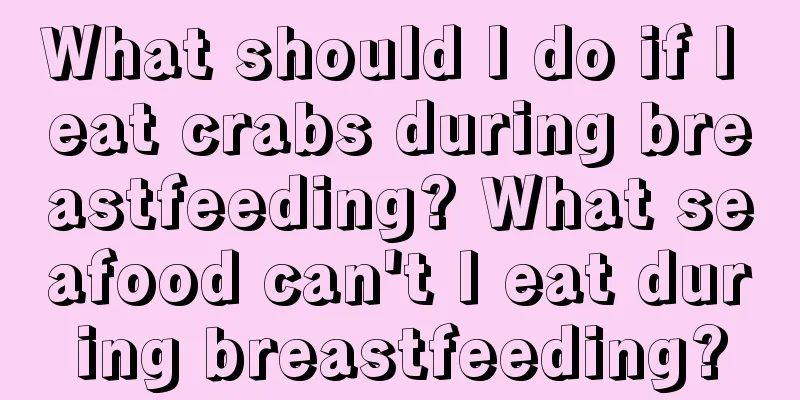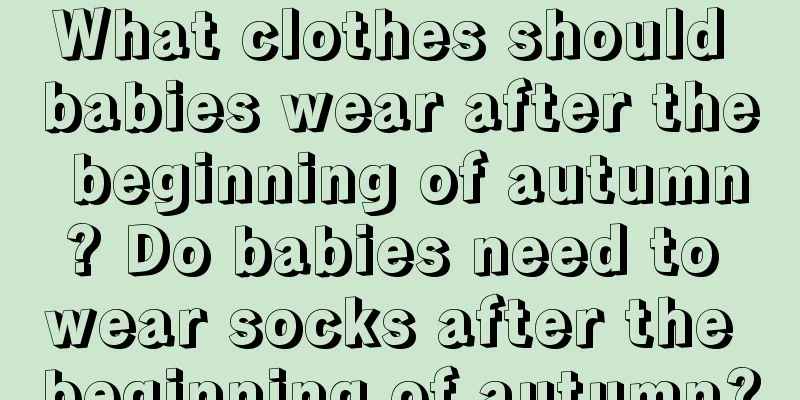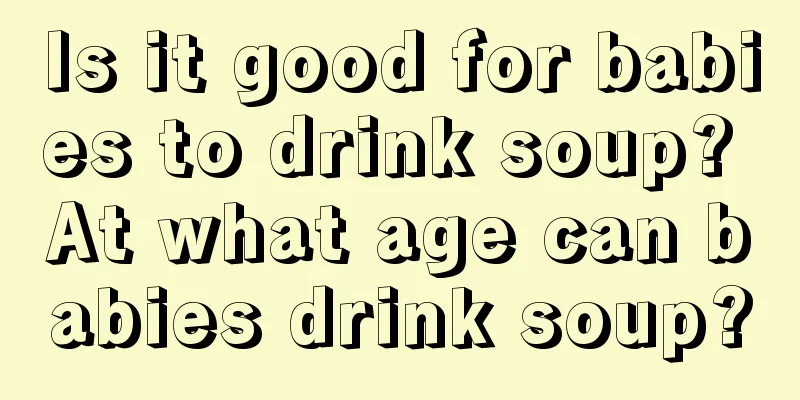What should I do if I eat crabs during breastfeeding? What seafood can't I eat during breastfeeding?

|
Mothers have to avoid certain foods during pregnancy, and they cannot eat many delicacies freely. During breastfeeding, they still have to eat healthy food for their babies. Some mothers can't help but eat crabs, so what should they do if they eat crabs during breastfeeding? What seafood can't be eaten during breastfeeding? Can I eat crabs during breastfeeding?You need to pay special attention to your diet during breastfeeding. Doctors recommend that you should not eat spicy, raw, cold, seafood, or greasy foods during breastfeeding. You should also avoid foods with high sugar and salt content. Although breastfeeding mothers can eat crabs, crabs are cold in nature and can easily cause skin allergies in babies, aggravate dampness, and induce autoimmune system disorders in babies. Eating crabs during breastfeeding may induce milk eczema in infants. There is a saying among the people that "milk eczema" refers to skin symptoms such as eczema and itching in children who have not been weaned. The doctor said: "Based on clinical cases, this is mostly caused by food allergies." According to a survey, the incidence of food allergies in children with allergic skin diseases is as high as 90.5%. Therefore, if a child repeatedly develops skin symptoms such as eczema, food allergies should be considered first. Food allergy refers to an abnormal immune response of the body after ingesting food, which leads to physiological dysfunction and triggers a series of clinical symptoms. The most obvious manifestation is on the skin, such as skin congestion, eczema, itching, urticaria, angioedema, etc. Gastrointestinal symptoms are also common, such as nausea, vomiting, abdominal pain, bloating, diarrhea, etc. Some people also experience symptoms on the nervous system, such as headaches and dizziness. In severe cases, they may suffer anaphylactic shock, a sharp drop in blood pressure, loss of consciousness, and difficulty breathing. If rescue is not timely, their lives may be in danger. Surveys show that infants under 3 years old are prone to allergies, with the highest incidence in infants under 1 year old and 4 to 6 months old being the most vulnerable age group; infants who start eating complementary foods within 4 months have a higher risk of allergies than those who start eating complementary foods. The main source of nutrition for babies who have not been weaned is breast milk. If breastfeeding mothers eat foods that are prone to allergic reactions, such as crabs, the possibility of allergies in babies will also increase. Therefore, doctors recommend that mothers should pay attention to limiting their diet during breastfeeding and eat less foods that are likely to cause allergies. Clinically, it has been found that foods that are prone to cause allergies in infants and young children include milk, eggs, soybeans, peanuts, etc. Foods that are prone to cause allergies in adults include fish, nuts, peanuts, crustaceans, etc. Crabs are raw and cold seafood foods, so you should try to eat less or no crabs during breastfeeding. Although crabs contain high-quality protein and iodine, they are cold in nature and contain a variety of proteins and purines, which can easily cause diarrhea or allergies in children. Sometimes crabs are prone to parasites, viruses, or heavy metals such as lead, which make us cautious when enjoying the delicious crabs. Therefore, considering the health of both mothers and children during breastfeeding, it is best to recommend breastfeeding mothers not to eat crabs as much as possible. What to do if you eat crabs during breastfeedingWhether eating crabs will cause discomfort varies from person to person. If you don't feel any discomfort after eating crabs, don't be nervous. If you don't feel any discomfort after eating crabs, but are just worried, you can eat two cloves of garlic, which is antibacterial; or eat ginger to neutralize the coldness of crabs. If you have already eaten crabs and feel uncomfortable, you can eat 3-4 preserved eggs at a time. Preserved eggs are alkaline and can neutralize the acid in the stomach to stop diarrhea. If your baby has some allergies or other discomfort symptoms after eating crabs, you must seek medical attention immediately! During breastfeeding, you should not eat spicy, cold, seafood, or greasy food, nor should you eat food with high sugar and salt content. But if mothers still can't help but eat too much, it is generally best to wait 3-4 hours before breastfeeding. What seafood can't be eaten during breastfeeding?If breastfeeding mothers often eat seafood (more than 4 times a week, more than 100 grams each time), it will affect the baby's nervous system development, and some symptoms will not appear until the child is 7 or even 14 years old. Therefore, breastfeeding mothers are better off eating less seafood. If mothers really want to eat seafood, they should eat it at most 1-2 times a week, with each serving being less than 100 grams. They should also avoid eating tuna, swordfish and other marine fish that have high mercury content. The mercury content of various fish is listed as follows: 1. Fish with the highest mercury content (best not to eat: grouper, marlin, bluefin salmon, orange roughy, tilefish, swordfish, shark, mackerel; 2. High mercury content (do not eat more than 170 grams three times a month): sea bass, halibut, tuna, sea trout, lobster (America/Maine); 3. Low mercury content (do not eat more than 170 grams six times a month): carp, crab (Dungeon crab), turtle, blue crab, herring, snow crab, perch (freshwater, river perch, golden perch), ray, cod; 4. Low mercury content (170 grams twice a week): anchovies, squid, fish roe (farmed), king crab, haddock, catfish, whitefish, sea bass, scallops, cage, haddock, hake, Atlantic herring, lobster (spiny, rock), American shad, sole, crayfish, salmon, shrimp, clams, tilapia, oysters, sardines, farmed sturgeon, freshwater trout. In addition, patients with gout, arthritis and hyperuricemia should also eat less seafood. Because seafood contains high levels of purine, patients are prone to form uric acid crystals in their bodies after eating it, which aggravates the condition. In addition, patients with hyperthyroidism should eat less seafood because seafood contains high levels of iodine, and too much iodine will also aggravate the condition. |
>>: How to wean your baby off breast milk - A complete guide for weaning babies aged 1 to 3
Recommend
When is the best time to take the ovulation injection? When is the best time to take the ovulation injection?
Many women who are eager to have children will ch...
What are the dangers of blowing your nose? In severe cases, it can cause otitis media and lead to deafness
When babies catch a cold, some mothers see their ...
What are the early symptoms of heart disease in children? What are the early symptoms of heart disease in children?
Congenital heart disease is a disease with a high...
What are the misunderstandings when purchasing child safety seats? The importance of child safety seats
How important are child safety seats? Parents who...
It is not easy for female stars to get pregnant quickly.
There have been many happy events of pregnancy an...
How old can a baby's nails be cut? The correct way to cut a baby's nails
Cutting a baby's nails is a big project. When...
What are the main causes of dystocia? How to promote uterine recovery?
Many pregnant mothers tend to overthink what if t...
What causes babies to be picky eaters? What should I do if my baby is picky eaters?
I believe that many parents have had such a heada...
Do I need to change the brand of baby rice cereal? Do I need to mix baby rice cereal with milk powder?
Usually babies under 1 year old eat milk powder a...
Can gestational diabetes cause premature birth? Can gestational diabetes cause dizziness?
Gestational diabetes is a relatively dangerous di...
Does the baby need to take medicine after the fever subsides? What should you pay attention to when the baby's fever subsides?
When a baby has a fever, some parents will take t...
What are the taboos for women before pregnancy
Newly married couples who have just finished thei...
What causes obesity in infants and young children? Two major reasons need to be noted
Many parents prefer white and plump infants and y...
How to buy clothes for your baby? A guide to buying clothes for your baby
Buying clothes for babies is a headache for many ...
The world's best rice noodles Chinese translation earthsbest rice noodles Chinese instructions
Earth's Best Rice Cereals is the best rice ce...









